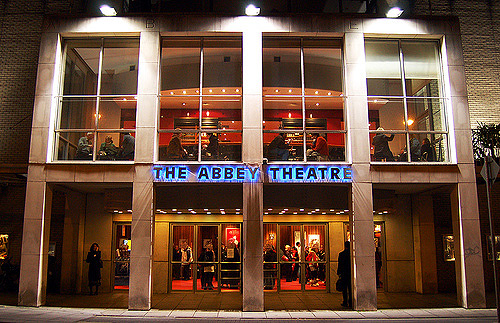
In Ireland’s national theatre, change is in the air. From the introduction of new free previews to the inclusion of more women playwrights, the traditional canonical mound upon which the Abbey was built, is being shaken, but not completely eroded. The changes have been brought about by the introduction of, for the first time in the Abbey’s history, a pair of new artistic directors, rather than a single visionary. Graham McLaren and Neil Murray have joined forces to ring in a new era for the Abbey.
Ulysses has reached the end of its run. This performance is a new stage adaptation of a novel that epitomises the Irish literary canon: the old and the new combined and reworked in original ways. This commercially successful performance makes innovative use of puppetry and brings a new life to the text. The Peacock’s most recent offering, Josephine K and Algorithms, presents another such melding of old and new, a blend of traditional theatre and innovation. The piece was a reworking of Kafka’s The Trial, re-written by Stacey Gregg as an almost dystopian tale of Josephine, who endures a witch hunt during the digital age.
The inclusion of Gregg as a female playwright may help quell the rumours of institutionalised sexism that plagued the Abbey following the scandal that provoked the Waking the Feminists movement. Though similarly, the inclusion of Gregg is something of a safe choice. The playwright, though only in her earlier thirties, has graced the Abbey theatre several times before, having achieved her first commission from the theatre at the tender age of twenty eight.
But enough of the past. As we look to the future, what does the Abbey’s new Autumn and Winter programme offer us? On the Peacock stage, Me, Sara is an original work, written by Dylan Coburn Gray, a recent Trinity music graduate. Continuing the pattern of re-igniting older texts, it is loosely based upon Synge’s play, The Playboy of the Western World. Coburn Gray’s Abbey debut will be made following the performance of Me, Sara in primary schools across Ireland. The inclusion of a children’s play in the Abbey’s catalogue is certainly a refreshing choice. Muireann Ahern is another Trinity graduate who will create work that will be performed on the stage this season. Along with Car Kennedy, she co-directs They Called her Vivaldi, an original work by Louis Lovett detailing the experience of one young woman with a pair of extraordinary ear muffs.
There’s no question that McLaren and Murray are taking on a challenge in directing the Abbey to integrate new material and canonical texts into the programme, which would prove a delicate operation in any theatre, let alone one which is often regarded as the pulse of Irish theatre. Thus far, it can be surmised that they have risen to that challenge.






